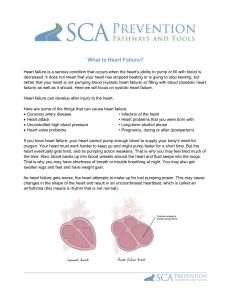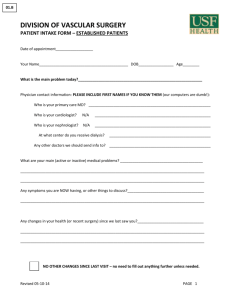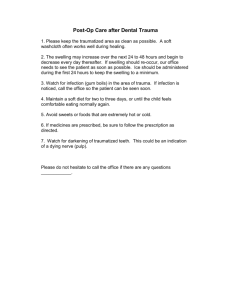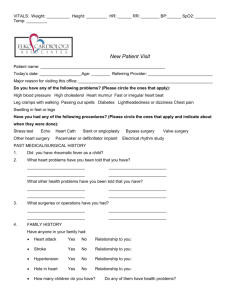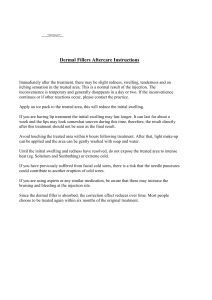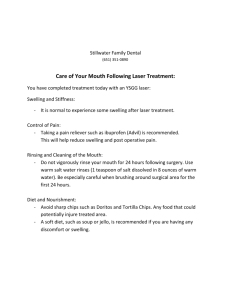Leg Swelling and Fluid Retention
advertisement
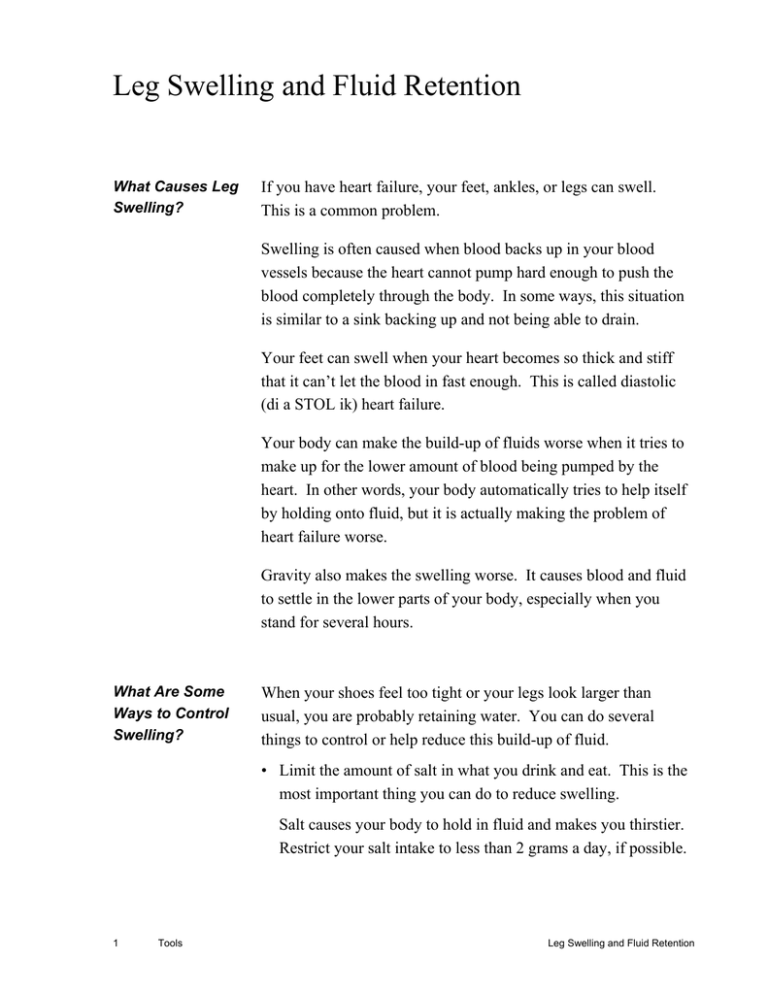
Leg Swelling and Fluid Retention What Causes Leg Swelling? If you have heart failure, your feet, ankles, or legs can swell. This is a common problem. Swelling is often caused when blood backs up in your blood vessels because the heart cannot pump hard enough to push the blood completely through the body. In some ways, this situation is similar to a sink backing up and not being able to drain. Your feet can swell when your heart becomes so thick and stiff that it can’t let the blood in fast enough. This is called diastolic (di a STOL ik) heart failure. Your body can make the build-up of fluids worse when it tries to make up for the lower amount of blood being pumped by the heart. In other words, your body automatically tries to help itself by holding onto fluid, but it is actually making the problem of heart failure worse. Gravity also makes the swelling worse. It causes blood and fluid to settle in the lower parts of your body, especially when you stand for several hours. What Are Some Ways to Control Swelling? When your shoes feel too tight or your legs look larger than usual, you are probably retaining water. You can do several things to control or help reduce this build-up of fluid. • Limit the amount of salt in what you drink and eat. This is the most important thing you can do to reduce swelling. Salt causes your body to hold in fluid and makes you thirstier. Restrict your salt intake to less than 2 grams a day, if possible. 1 Tools Leg Swelling and Fluid Retention What Are Some Ways to Control Swelling? continued • Lie down and/or raise your legs above the level of your heart. For example, rest with your legs up on pillows. When you are lying down to sleep, fluid moves from the legs into the central part of your body. This may cause you to have to go to the bathroom and interrupt your sleep. Try to keep your feet elevated as much as possible during the day. • Limit how much water you drink. If you have swelling, drink less than 2 quarts or 2 liters a day of all fluids. Ask your doctor what he or she recommends for you. • Wear support stockings to prevent water build-up in your legs. Put the stockings on in the morning and wear them throughout the time you plan to be standing. How Do You Use Diuretics? Diuretics (di u RET iks), or water pills, can help your body get rid of excess water and salt. Your doctor will adjust your medicine according to the amount of extra water you retain, your kidney function, and your overall health. Even when you take water pills, you need to control your salt and water intake. Sometimes, they make you feel more thirsty because you are passing so much liquid. If you are a heart failure patient, you should restrict your fluid intake to less than 2 quarts or a liter per day in order for water pills to help you. How Can You Use Weight Gain to Measure Fluid Retention? 2 Tools Your weight is the best single measure of your body’s water status from day to day. Your weight will change before you can see your feet swell. Leg Swelling and Fluid Retention How Can You Use Weight Gain to Measure Fluid Retention? continued Weigh yourself every morning or evening. Try to wear the same amount of clothing, or no clothing, every time you weigh yourself. Write down your weight so you can see how it goes up and down from day to day. If you gain several pounds in one day, you are probably retaining fluid. It is very hard to gain that much weight in one day from overeating. Ask your doctor how much your weight can change before you should call his or her office. Also, when you change your water pills, ask your doctor how much change in your weight you can expect and what you should do if your weight changes too slowly or too quickly. How Can You Ease Skin Problems Caused by Swelling? When your legs swell, your skin can become red, dry, scaly, or itchy. It can also cause ulcers to develop. Keeping your legs elevated will help keep your skin healthy. In many people with heart failure, water pills alone will not keep the swelling and skin problems away. You may also need to elevate your legs and wear support stockings to prevent swelling, skin problems, and ulcers of the legs. Glossary 3 Tools Term Pronunciation Definition Diastolic di a STOL ik The pressure when the heart is relaxing Diuretics di u RET iks A medicine that increases the flow of urine to rid the body of extra fluid Leg Swelling and Fluid Retention
